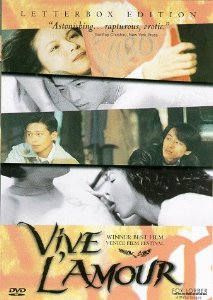
Tsai Ming-liang is a Malaysian filmmaker based in Taiwan. Tsai has written and directed 11 feature films, many short films, and television films. He is one of the most celebrated "Second New Wave" film directors of Taiwanese cinema. His films have been acclaimed worldwide and have won numerous awards at festivals. In 1994, Tsai won the Golden Lion at the 51st Venice International Film Festival for the film Vive L'Amour.
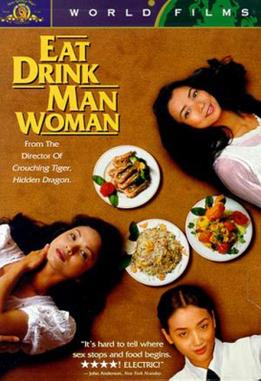
Eat Drink Man Woman is a 1994 Taiwanese-American comedy-drama film directed by Ang Lee, from a script co-written with James Schamus and Hui-Ling Wang. It stars Sihung Lung, Wang Yu-wen, Wu Chien-lien, and Yang Kuei-mei. as members of the Zhu family navigate the challenges of love, life, tradition and family. Part of Lee's "Father Knows Best" trilogy and similar to Lee's other works, this film deals with the transition from tradition to modernity. It is Lee's only film, to date, to be shot entirely in his native Taiwan.

The Wayward Cloud is a 2005 Taiwanese film directed by Tsai Ming-liang and starring Lee Kang-sheng and Chen Shiang-chyi.

The Hole, also known as The Last Dance, is a 1998 Taiwanese drama-musical film directed by Tsai Ming-liang. It stars Yang Kuei-mei and Lee Kang-sheng.

What Time Is It There? is a 2001 Taiwanese film directed by Tsai Ming-liang. It stars Lee Kang-sheng, Chen Shiang-chyi, and Lu Yi-ching.

Rebels of the Neon God is a 1992 Taiwanese drama film written and directed by Tsai Ming-liang in his feature film directorial debut. It stars Lee Kang-sheng, Chen Chao-jung, and Jen Chang-bin.

Lee Kang-sheng is a Taiwanese actor, film director and screenwriter. He has appeared in all of Tsai Ming-liang's feature films. Lee's directorial efforts include The Missing in 2003 and Help Me Eros in 2007.
The 18th Golden Melody Awards ceremony for popular music category was held on June 16, 2007. The Azio TV broadcast the show live from the Taipei Arena in Taipei, Taiwan. The ceremony recognized the best recordings, compositions, and artists of the eligibility year, which runs from January 1, 2006 to December 31, 2006.
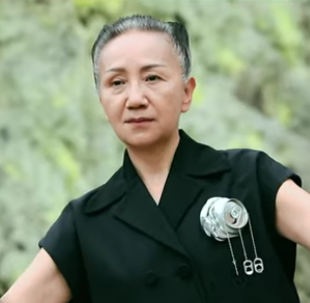
Lu Yi-ching is a Taiwanese actress. She has appeared in several films directed by Tsai Ming-liang, such as What Time Is It There? and The Wayward Cloud, and films by Cheng Wen-tang, including Blue Cha Cha. Lu lives in Taipei.
Ceremonies of the 19th Golden Melody Awards were held in Taipei, Taiwan in 2008. Nominees were announced on May 22, 2008, and the award winners in 12 traditional music categories and 23 popular music categories were selected by a panel of 33 judges after four rounds of jury meetings. Initially, there were 10,632 submissions from 185 companies in the music industry, making it the largest submission pool in the Awards' history.
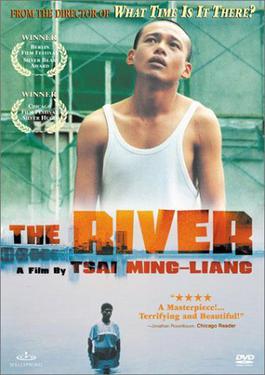
The River is a 1997 Taiwanese film directed by Tsai Ming-liang and starring Lee Kang-sheng, Miao Tien, and Lu Yi-ching. The plot centers on a family who has to deal with the son's neck pain. In 2003, a critic called it Tsai's "bleakest film."
The Skywalk is Gone is a 2002 Taiwanese short film directed by Tsai Ming-liang and starring Chen Shiang-chyi and Lee Kang-sheng.
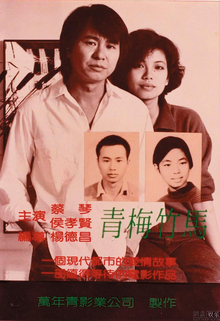
Taipei Story is a 1985 Taiwanese film directed by Edward Yang — his second full-length feature film and third overall. The film stars Hou Hsiao-hsien and singer Tsai Chin to depict the grinding relationship of Ah-lung and Ah-chen, who have known each other since childhood in Taipei. It is doomed to fail because Ah-lung cannot forget about the past while Ah-chen is eager to embrace the future as Taipei undergoes modernization and globalization. Taipei Story is one of the representative films of the New Taiwanese Cinema. It won the FIPRESCI Prize at the 38th Locarno Film Festival in 1985.

Face is a 2009 Taiwanese-French film written and directed by Tsai Ming-liang.

The 51st annual Venice International Film Festival was held on 1 September to 12 September, 1994.
Darkness and Light is a 1999 Taiwanese narrative film directed by Chang Tso-chi. It was screened as part of the Directors' Fortnight section of the 52nd Cannes Film Festival, and won the Grand Prix at the 12th Tokyo International Film Festival. Darkness and Light was also nominated for seven different categories at the 36th Taipei Golden Horse Film Awards and went on winning the Jury Award, the Best Original Screenplay Award, and the Best Film Editing Award. In 2010, it was ranked 43 of the Top 100 Chinese-language films by the Taipei Golden Horse Film Festival and Awards Committee.

Chinese Taipei competed at the 1994 Asian Games in Hiroshima, Japan. This was their 6th appearance in the Asian Games. They won at total of 7 gold, 13 silver, and 24 bronze medals, or 44 medals in total. They improved from the previous Asian Games in 1990, where they won a total of 31 medals. They won the most medals in Judo, where they got a total of 1 silver and 5 bronze.
Taiwanese animation or Taiwanese donghua can be traced back to 1954's black-and-white animation Wu Song Fights the Tiger (武松打虎) by the Kuei Brothers but the earliest surviving is The Race Between Turtle and Rabbit (龜兔賽跑) produced at the end of the 1960s by the Kuangchi Program Service and was also the first color animation in Taiwan. In the 1970s, Taiwanese animators went abroad to study the animation production techniques in the United States and Japan, opening up Taiwan's OEM animation and homemade industry.
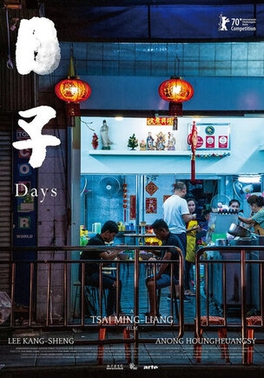
Days is a 2020 Taiwanese slow cinema drama film directed by Tsai Ming-liang. It was selected to compete for the Golden Bear in the main competition section at the 70th Berlin International Film Festival. It won the jury Teddy Award at the 70th Berlinale.

Light the Night, previously known as Blue Hour, is a 2021 Taiwanese Netflix original series written by Ryan Tu and directed by Lien Yi-chi. The series stars Ruby Lin, Yo Yang, Cheryl Yang, Rhydian Vaughan, Derek Chang, Puff Kuo, Esther Liu, Cherry Hsieh and Nikki Hsin-ying Hsieh.
